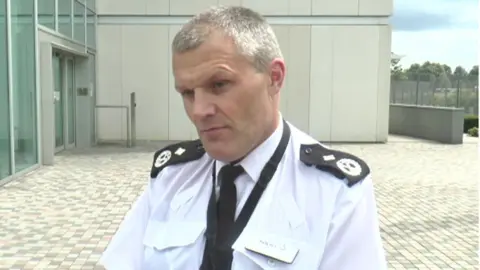More than two thirds of thefts are 'never solved'
 Getty Images
Getty ImagesMore than two thirds of police investigations into thefts and burglaries have been closed with no suspect ever being identified.
The BBC analysed some 18 million crimes over a five-year period across 43 police forces in England and Wales.
Charity Victim Support said victims should be able to review police decisions not to investigate crimes.
Police say they follow up all evidence but had "limited resources" and had to prioritise.

BBC England's data unit compiled the figures between 2012 and 2016 from the official police data website, which goes into greater detail than the published crime statistics. The investigation focussed on crime cases that were closed because no suspect had been identified.
It found:
- Some 75% of all bicycle thefts and more than two thirds of burglaries, vehicle crime and other types of theft saw their investigations closed with no suspect identified.
- It was the same for about two thirds of criminal damage and arson and more than 60% of robberies.
- Drug crimes, sexual offences and violent crimes had a lower rate.
One force has resubmitted its data after analysis showed it had some of the highest rates of unsolved crimes. Surrey Police stressed its figures were in line with the national average.
Victim Support spokeswoman Rachel Almeida said: "It is imperative the police explore every avenue when investigating a crime.
"It is also vital that decisions made by the police about investigations, and the reasoning behind their decisions, are clearly and fully communicated with victims so they do not feel they have been left in the dark."

No suspect identified - Which force uses it most by crime type?
- Bicycle theft - West Midlands Police (93%)
- Theft from the person - Greater Manchester Police (93%)
- Burglary - Greater Manchester Police (85%)
- Vehicle crime - West Midlands Police (85%)
- Other theft - Surrey Police (83%)
- Criminal damage/arson - Surrey Police (79%)
- Robbery - Hertfordshire (71%)
- Violence and sexual offences - Hertfordshire (66%)
- Possession of weapons - Hertfordshire (60%)
- Public order - Surrey (59%)
- Other crime - Hertfordshire (51%)
- Shoplifting - Surrey (49%)
- Drugs - Metropolitan Police (11%)
Figures are for crimes between January 2012 and December 2016 except for bicycle theft, which starts from 2013, while possession of weapons, public order and violence and sexual offences start from 2014. Surrey Police disputes its statistics and is re-submitting its data.

'I stole back my own bike'

Jenni Morton-Humphreys ended up "stealing" her own bicycle back after tricking the culprit by pretending she wanted to buy it.
Avon and Somerset Police said they had carried out a full investigation but "exhausted all current possible lines of inquiry".
Bicycle theft was the crime where investigations were most commonly closed without a suspect being identified.
Ms Morton-Humphreys found her £800 Cube bike after appealing for help on Facebook. She then pretended she wanted to try it out before buying it, but rode away.
She said: "I cycled on the pavement, fell off a couple of times, then I saw a corner, took it and cycled as fast as I could and didn't look back."
The police said they advise against people "taking matters into their own hands" due to the risks and because it "provides criminals with an opportunity to destroy evidence before we can investigate them."
While some forces had closed investigations because no suspect was found, others left them listed as under investigation.
The Metropolitan Police listed just 41% of bicycle thefts as "no suspect identified", but its data showed more than half of investigations dated back to 2013 still apparently open.
Sam Jones, Cycling UK campaigns co-ordinator, said: "Bike theft and the tracing of stolen bikes has long been a problem which plagues both the police and cyclists. While Cycling UK understands the difficulties of hunting down individual bikes, we believe targeting the market itself would be a more effective use of police time and resource.
"Clamping down on well-known market places for stolen bikes, including online forums, would swiftly begin to bear fruit."

What the police say

West Midlands Police Superintendent Andy Beard said: "We will always carry out proportionate investigations and in cases where there is evidence or clear lines of inquiry they will be followed up by investigators."
Mr Beard said a large proportion of vehicle thefts occurred overnight when there were "limited evidential opportunities", and that around a quarter of those thefts were as a result of drivers leaving their vehicles unsecure.
"Thousands of offences a year could be prevented by people taking simple car security measures," he said.
Greater Manchester Deputy Chief Constable Ian Pilling said: "Our resources are limited and we cannot do everything we would want to. We have to prioritise our workload to focus on the most serious crime which represents the greatest threat, harm and risk to the public.
"This means that we will assess every crime reported to us and that we will make decisions based on the threat and risk involved and on the likelihood of arresting and convicting the offender.
"In many crimes, there are no witnesses, CCTV or forensic opportunities, which means there are no leads for the officer to investigate further."
Surrey Police said the force was re-submitting its records to the database as the figures were "wrong".
A spokeswoman said: "Since April 2014... Surrey Police's statistics have consistently been in the mid-40% range. As a result of the inaccuracies in the data, having been identified through this inquiry, Surrey Police is re-submitting its data to get this corrected."
Hertfordshire Police said it was "determined to rigorously record crime".
A spokesman said: "Our priority is that we put victims at the centre of policing and ensure they are treated with compassion, care and support throughout so that they have the confidence to report crime to us."

The BBC England Data Unit downloaded the street level crime data from the official police data site. We excluded anti-social behaviour as no outcome category is recorded. We also excluded the British Transport Police and Police Service Northern Ireland for the same reason. Police Scotland data is not kept at this site.
The data provides details of individual crimes at street level, including an approximate location, the month and year it occurred, the type of crime and the last known outcome.
Separate annual figures released by the Home Office show just under half of all crimes (48%) had their investigations completed with no suspects identified in 2015-16. This data is supplied by forces to the Home Office and is "quality assured" by statisticians, whereas the figures in the police data are constantly being updated, providing a "snap-shot" of crimes.
The police data analysed by the BBC covers five years rather than a single 12-month period.
- Update 18 September 2017: Following publication Hertfordshire police conducted its own further analysis which suggested it had a far lower rate of crimes with no suspect identified than was recorded in the police.uk database. It said a "local assessment" by the force found 10% of investigations into violent and sexual offences were completed with no suspect identified between 2014 and 2016, 47% of robberies, 3% for possession of weapons and 29% for miscellaneous and other crimes.
